
OFFSIDEMany Iranian girls love soccer as much as their countrymen and sport fans all over the world but, they are prevented by law from attending live soccer matches in their country. Inspired by the day when his own daughter was refused entry to a soccer stadium in Iran, Jafar Panahi's OFFSIDE follows a day in the life of a group of Iranian girls attempting to watch their team's World Cup qualifying match against Bahrain at the stadium in Tehran. 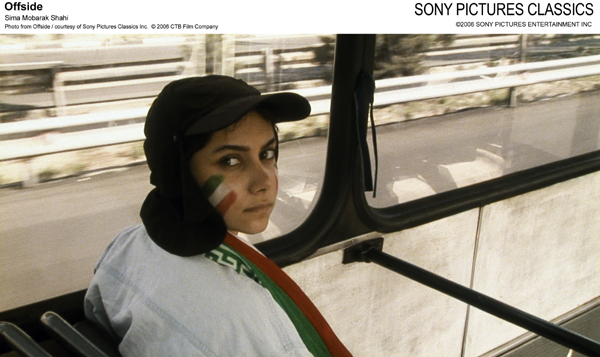 A disparate group of girls, united only by their desire to see their beloved team play live and in-person, disguise themselves in myriad ways, risking arrest to try to get into the game. The girls are either caught trying to get in or are spotted in the crowd once they make it past the entry guards, and all are taken to a holding area on the upper level of the stadium, where they are tortured by being able to hear the roar of the crowd without being able to see what is happening in the match. The young women, who range from timid to tomboy, are guarded by a group of naïve young soldiers who would rather be watching the game themselves, out with their girlfriends or at home looking after their sheep. The soldiers and their prisoners are so close in age, and the girls crimes so harmless, that they have a hard time maintaining their adversarial roles. 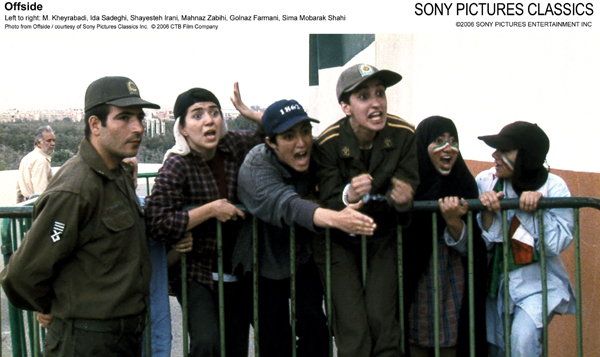 As they wait out the game, the young men interact with and befriend the generally far more savvy women. One girl is a tomboy from the city who taunts the guards about their country ways. Another young woman relates the adventure that got her caught to cheers from the other girls' she stole an officer's uniform to disguise herself but, made the mistake of sitting in the wrong chair in the VIP enclosure. One young soldier, who is as much a fan as his captives, is persuaded into shouting out the highlights of the game as he watches through a gate. When he is scolded by a slightly superior officer, his punishment is being forced to escort one of the girls to the bathroom. Fearful of how the men in the stadium might react, he punches out the eyes of a cardboard player's poster to make a mask for his prisoner, so she won/t offend any men on the way. One girl turns out not to be a soccer fan at all but, has her own sentimental reasons for wanting to be at the game in honor of a friend. As the game nears it's end, the girls are rounded up in a van to be transported to jail, along with another young man who was caught setting off firecrackers in the stadium. The soldier in charge is persuaded to turn on the radio so they can hear the final moments of the game on the way and, when Iran defeats Bahrain to win the qualifying match, the day ends happily for all. 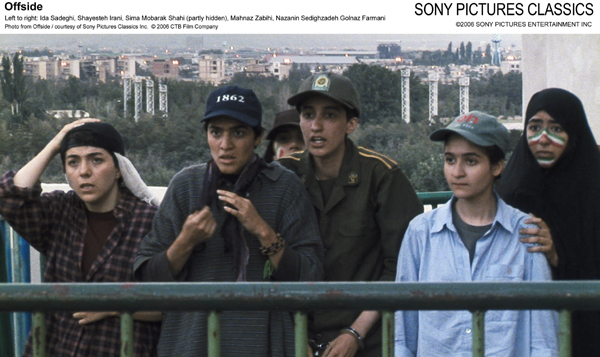 JAFAR PANAHI ON OFFSIDE In Iran, like many other countries, football is very important. As you can imagine, the majority of distractions are rather limited. So football is both sport and entertainment. It's an opportunity for people to shout, let themselves go, expel all the pent-up energy within them. Sometimes, when a match coincides with a demonstration, and Iran wins, the demonstration becomes more intense. Origins of the ProjectEight years ago Iran beat Australia and qualified for the World Cup. Upon their return the players were given a triumphant welcome by the population. It is prohibited in Iran for women to enter sports stadiums. However, this time they were granted the right to celebrate the players return. Five thousand women turned up and went inside stadium, and this spurred a lot of debate as to why women are forbidden from entering in the first place. I remember at the time reading an article by a sports journalist, explaining that even in Ancient Greece, women were confronted with this problem. Four hundred years B.C. women had to disguise themselves as men in order to cheer on their sons who were sports heroes. Whether or not this is true, it triggered my first ideas on the subject. 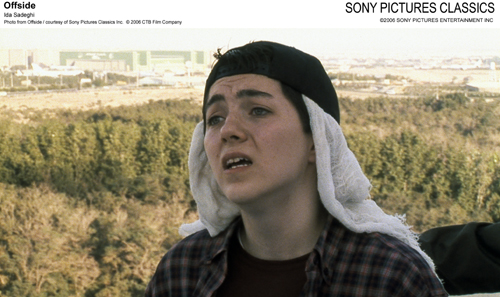 Also, four years ago I was living near the stadium where our football team trains. I wanted to go and watch and my daughter wanted to come with me. I tried to explain to her that she couldn't, but she nevertheless wanted to try. So we set out with the entire family, that way if my daughter was refused entry, my wife could take her back home. We went to the stadium entrance and, as I had expected, my daughter was refused entry. I told her to go home with her mother, but she found another way of getting into the stalls and to my surprise, she joined me. This event also inspired my thoughts about the film, which I tucked away in a corner of my mind. When I realized Iran once again had a chance at being selected for the World Cup, I decided the time was right to do this film. The LawThere is a problem in Iran because the barrier between what is permitted and forbidden isnt always very clear. If, for example music is banned, you can be sure that people will listen to it even more. Also, those who are there to enforce the laws have their own personal interpretations of them. For this reason, we never really know if we are dealing with an actual law or someone's interpretation of it. Military service in Iran is mandatory, they are not civil servants. These guys come from normal families, they are just like everybody else. So they can easily relate to the urges and desires of their generation. These soldiers are there to pose restrictions, but they don't always feel comfortable with what they're doing. And then you have the elderly, with their more traditional views. The traditionalists represent nearly ten percent of the population, and they have the power. And there is of course, a clash between these two generations. 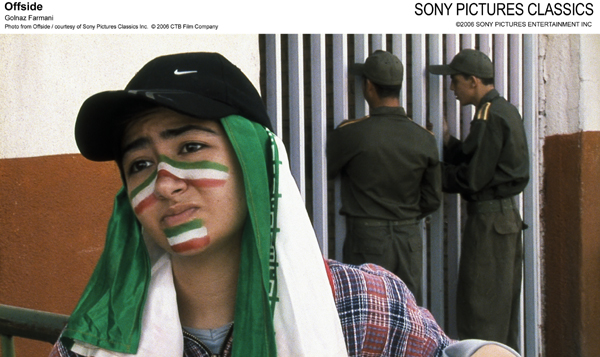 Every restriction is the result of many other restrictions. If we look at one limitation in particular, it prompts us to consider many more. My films work in the same way. I take a relatively simple subject and try to develop all the issues surrounding it, everything in general which relates to this one simple subject. This one small problem ends up representing a greater problem on a larger scale in society. The World Cup is an international event. Whether it be in Iran or Japan, we all aspire to the same values and that is why we must eradicate oppression. Perhaps our Iranian girls are also expressing a desire to be part of the global community. But this is not meant to be the message of my film, the audience free to take from it whatever they want. Almost like a DocumentaryThe film is constructed like a documentary in which I have inserted characters. Are we in a documentary, or is this fiction? I wanted the action to reflect this ambiguity. So we tried to preserve a unity of time, so that each second that passes the viewer feels he or she is watching a real event unfolding. The places are real, the event is real, and so are the characters and the extras. This is why I purposefully chose not to use professional actors, as their presence would have introduced a notion of falseness. We ran into many obstacles making this film. It's not terribly difficult to obtain an authorization to film a football match in Iran, but if you film girls in the stadium, that's another story! And then there was the issue of my reputation as a director, which we knew from the start would be a problem. We tried to be very discreet and avoid any mention in the press. However, five days before the end of the shoot, a newspaper published an article stating I was directing a new film. The military immediately gave orders to interrupt the shoot. We were instructed to bring them our rushes to be verified. I immediately announced to the official in charge of cinema in Iran that this was out of the question, and that I would not allow a single soldier during the final days of the shoot. Luckily, there were only a few scenes left to shoot, inside a minibus, so we just left the military zone and continued filming sixty kilometers outside of Tehran. 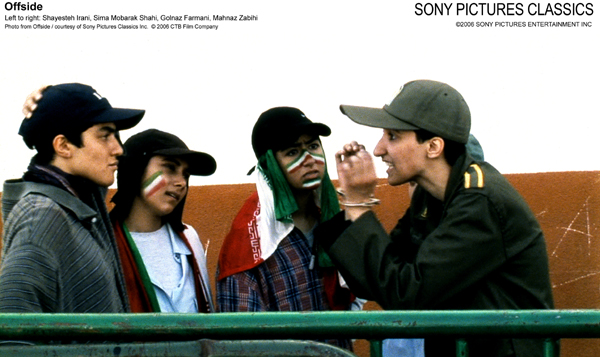 Reactions in Iran If a film is selected at the Tehran film festival, it is easier for it to find a distributor in Iran. Every year, I fill out all the necessary applications for the festival but for the time being my films have not yet been released in Iran. I have no other choice but to remain optimistic. Perhaps because there is humor in this film, it stands a chance of being released this year. I think that if the film is shown, it will re-ignite discussions about letting women into the stadiums. With the World Cup approaching, the timing is fabulous. Perhaps that's just a dream, but I continue to hope. Japan vs. Iran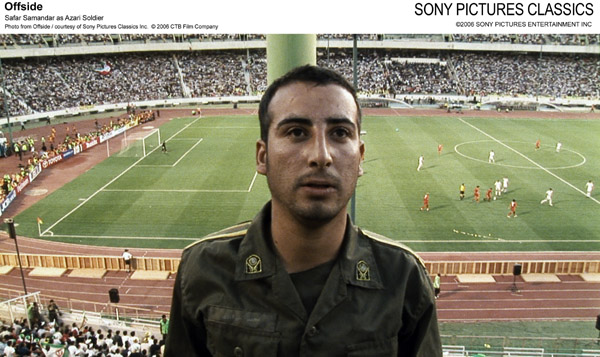 There were approximately one hundred and ten thousand people at this game. When it was over, there was a military helicopter at the stadium exit, surrounded by soldiers so that the crowd couldn't get near it. The soldiers started to push the crowd and some people were trampled in the crush. Seven people died and many more were injured, but the Iranian press published photos of only six of the dead. The rumors were that the seventh victim was a girl. We have no tangible proof of this, though we did learn that one of the injured parties was a girl disguised as a boy. Closing SongThe song I used to close the film is a sort of a national hymn. Sixty years ago, when the Westerners were in Iran, one of our poets witnessed the abuses inflicted on the Iranian people. He was so pained by what he saw he decided to write a song. The song speaks of our country and our people, not the States that have governed it. That is why we love it more and more with each passing day. Many singers have sung it over the years. The version we have chosen was the one that seemed the most epic to me. 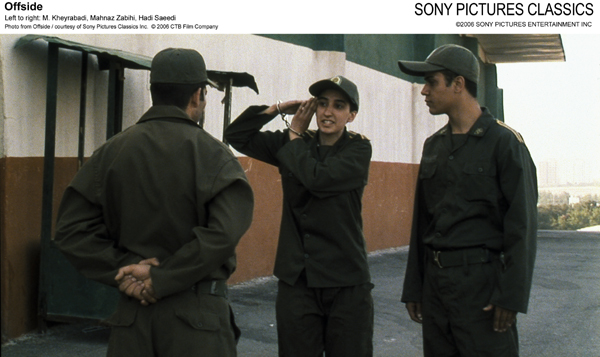 ABOUT JAFAR PANAHI The cinema of Jafar Panahi is often described as Iranian neo-realism. Regardless of how one chooses to categorize his powerful work, the unprecedented humanitarianism of Panahi's films cannot be denied. Panahi's cinema is urban, contemporary and rich with the details of human existence. Panahi's THE CIRCLE won the Golden Lion at the 2000 Venice Film Festival. The unsettling drama about the social dilemma of several modern Iranian women was named FIPRESCI's «Film of the Year» and appeared on Top 10 lists of critics worldwide. Panahi debuted with 1995's THE WHITE BALLOON, Camera d'Or winner at the Cannes Festival. The story of a young girl's adventures as she seeks to buy a lucky goldfish for New Year, THE WHITE BALLOON marked the emergence of a new cinema talent. Panahi's 1997 film, THE MIRROR, received the Locarno Festival's Golden Leopard, and confirmed the young director's promise. CRIMSON GOLD was selected in Un Certain Regard at Cannes in 2003 where it won the Jury Prize. It went on to win a number of best film awards and opened to excellent critical response. 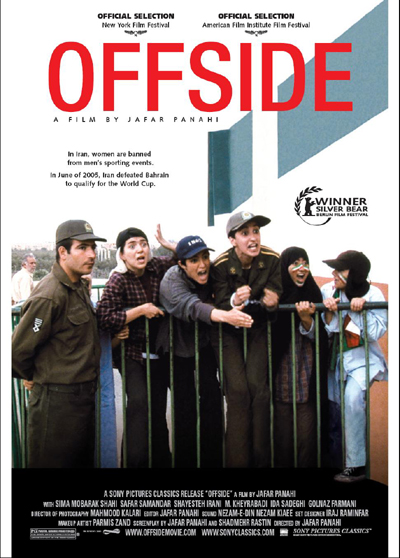 Filmography 1995 THE WHITE BALLOON 1997 THE MIRROR 2000 THE CIRCLE 2003 CRIMSON GOLD 2006 OFFSIDE CAST Sima Mobarak Shahi First girl Safar Samandar Azari Soldier Shayesteh Irani Smoking girl M. Kheyrabadi Mashadi soldier Ida Sadeghi Girl soccer player Golnaz Farmani Girl with chador Mahnaz Zabihi Soldier girl Nazanin Sedighzadeh Young girl M. Kheymeh Kabood Tehrani Soldier Mohsen Tanabandeh Ticket seller Reza Farhadi Old man M. R. Gharadaghi Boy with firecrackers CREW Producer, Editor, Director Jafar Panahi Director of Photography Mahmood Kalari Screenplay Jafar Panahi & Shadmehr Rastin Sound Engineer Reza Delpak Sound Recordist Nezam-e-din Nezam Kiaee Set Designer Iraj Raminfar Make-up Artist Parmis Zand Assistant Director Ramin Rastad Production Manager Saeed Hashemi Production Coordinator Davood Samavatyar Production Substitute Ali Baradari Sound & Editing Assistant Mehrdad Jelokhani. Watch the trailer Music Hall, Beverly Hills Town Center 5, Encino Westpark 8, Irvine NEW YORK Lincoln Plaza Quad Cinema
|